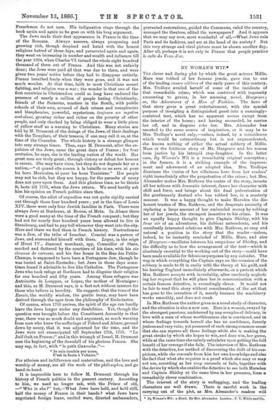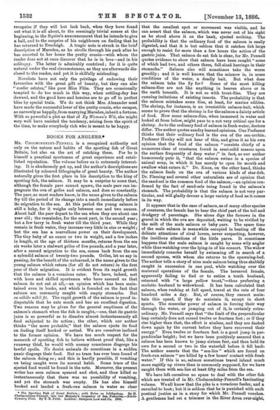BY WOMAN'S WIT"
Tux clever and daring plot by which the great actress Mdlle. Mars was robbed of her famous jewels, gave rise to one of the leading causes celebres of the early years of this century. Mrs. Trollope availed herself of some of the incidents of that remarkable crime, which was contrived with ingenuity amounting to genius, in her amusing novel, Hargrave ; or, the Adventures of a Man of Fashion. The hero of that story gives a great entertainment, with the special purpose of inveigling a distinguished guest into a onnningly- contrived tent, which has no apparent access except from the interior of the house ; and having succeeded, he carries her off, and in disguise robe her. Mrs. Alexander has resorted to the same source of inspiration, or it may be to Mrs. Trollope's novel only,—unless, indeed, by a coincidence which would be extraordinary but is not unprecedented, she knows nothing of either the actual robbery of Mdlle. Mara or the fictitious story of Mr. Hargrave and his rescue from justice by his intrepid step-daughter. In the latter case, By Woman's Wit is a remarkably original conception ; in the former, it is a striking example of the improve- ment and adornment of an adopted idea. Mrs. Trollope dismisses the victim of her villainous hero from her readers' sight immediately after the perpetration of the crime ; but Mrs. Alexander makes Mrs. Ruthven the centre of the story, invests all her actions with dramatic interest, draws her character with skill and force, and brings about the final pulverisation of the gentlemanly dastard who has robbed her, in a masterly
manner. It was a happy thought to make Marsden the dis- honest trustee of Mrs. Ruthven, and the desperate necessity of replacing a large amount of her embezzled money by robbing her of her jewels, the strongest incentive to his crime. It was an equally happy thought to give Captain Shirley, with his
faux air of an adventurer, his dubious antecedents, and his manifestly interested relations with Mrs. Ruthven, so easy and natural a position in the story that the reader—unless, indeed, he be instantly reminded of Mdlle. Mars, and also of Hargrave—vacillates between his suspicions of Shirley, and the difficulty as to how the arrangement of the tent—which is absolutely essential to the working out of the story—could have been made available for felonious purposes by any outsider. The way in which everything the Captain says on the occasion of the robbery is made to fit in easily with the theory of his guilt, and his leaving England immediately afterwards, on a pretext which Mrs. Ruthven accepts with incredulity, after carelessly neglect- ing her request that he will place her in communication with a certain famous detective, is exceedingly clever. It would not be fair to read this story without consideration of the art that has gone to the invention of it, merely because the machinery works smoothly, and does not creak.
In Mrs. Ruthven the author gives us a novel study of character, and the situation is also a new one. Here is a woman, swayed by the strongest passions, undeterred by any scruples of delicacy, in love with a man of whose worthlessness she is convinced, and in whose feelings towards herself she has no confidence, fiercely jealous and very vain; yet possessed of such strong common-sense that she can repress all those feelings while she is making the great stroke by which she hopes to win, and does win, her game, while at the same time she calmly calculates upon getting the full benefit of her revenge if she fails. The interview of Mrs. Ruthven with the detective, her method of discovering the drift of his sus- picions, while she conceals from him her own knowledge and also the fact that what she requires is a proof which she may or may not use, according as her coup succeeds or fails, together with the device by which she enables the detective to see both Marsden and Captain Shirley at the same time in her presence, form • remarkably clever combination.
The interest of the story is unflagging, and the leading characters are well drawn. There is careful work in the carrying out of the plot, as Mrs. Alexander's readers will • By Woman's Wit: a Mosel. By Mrs. Alexander. London : F. V. White and 00.
recognise if they will bat look back, when they have found out what it is all about, to the seemingly trivial scenes at the beginning, to the Squire's announcement that he intends to give a ball, and to the surprise of his neighbours on finding that he has returned to Evesleigh. A tragic note is struck in the brief description of Marsden, as he strolls through his park after he has escorted to her home the pretty cousin—with whom the reader does not at once discover that he is in love—and in his soliloquy. The latter is admirably contrived ; for it is quite natural under the real circumstances, as they are afterwards dis- closed to the reader, and yet it is skilfully misleading.
Novelists have not only the privilege of endowing their favourites with the great gift of beauty, but they can also "confer estates," like poor Miss Flite. They are occasionally tempted to do too much in this way, when settling-day has dawned, and the good hero and heroine are to go off to perfect bliss by special train. We do not think Mrs. Alexander need have made the successful lover of the pretty cousin, who escapes, as narrowly as happily, from marrying Marsden, inherit a fortune. With so powerful a plot as that of By Woman's Wit, she might very well have resisted the tendency, arising from the spirit of the time, to make everybody rich who is meant to be happy.



































 Previous page
Previous page